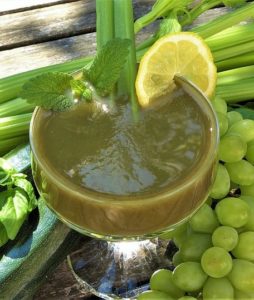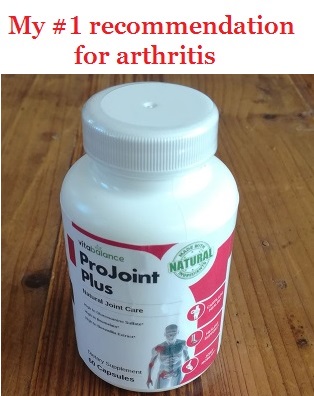Is Celery Good For Arthritis? (9 Ways It Helped My Joint Pain)

If you’re looking for a natural anti-inflammatory, don’t look too far – Turmeric, Boswellia and Cayenne pepper are all pretty famous.
But why don’t you try something less exotic? Something that you can find in any regular shop. Well, let me give you just one name – celery.
So is celery good for arthritis? Can it decrease inflammation as well as the herbs above?
I tried celery myself and it made me a great impression. It’s not the #1 herb I know, but it still has a pretty strong effect. Let me show you just 9 things it did for my pain.
So if you’re looking for a cheap natural remedy, I say you give celery a try.
#1 – Pain Reliever
The worst thing about arthritis is that you’re always in pain. Whether it’s your hands, legs or back hurting, arthritis is making your joints swollen and inflamed.

How It Helps: Well, that’s where celery can come up. It contains 2 major classes of ingredients:
- flavonoids
- polyphenol compounds
These substances can partially decrease the inflammation from your joints – and consequently, the pain.
Besides, eating celery for a longer period also comes with 2 additional benefits:
- Your flare-ups become more rare
- At one point, they may even go away (depending on how sever is your condition)
But don’t imagine that simply eating celery everyday will cure your arthritis. In fact, you may not even notice any change for a long time.
As it’s a herbal remedy, celery is not as strong as drugs like prednisone or methotrexate. In fact, it’s not even as strong as turmeric.
But that’s what makes it free of any side effects. So this plant can relieve your pain on the long term, while keeping you on the safe side.
#2 – Prevents Pain Insomnia
If you have an auto-immune form of arthritis, you surely know what it means to stay awake because of the pain. Sometimes your pain can worsen at night – and no medicine manages to calm it down.
How It Helps: So what can celery do about it? Unfortunately, it can’t cure that terrible pain. At least not that fast.
But it can make you fall asleep much faster, despite the pain. Here’s why:
Celery contains a high quantity of magnesium. Studies showed that magnesium calms down your nervous system:
- It decreases your stress level pretty fast
- Once your nerves are relaxed, you are much more likely to fall asleep
However, there’s also a bad side.
Certain patients with arthritis experience fatigue in some days. If that was your case, celery would only make you feel even more tired.
The good news is that this fatigue isn’t chronic, so it only appears at times. Try to stay away from celery in those days and everything should be fine.
#3 – Decreases Gout Attacks
Believe it or not, celery doesn’t only help arthritis pain. It’s also a great way to reduce your gout flare-ups. How’s that?

How It Helps: Well, besides its anti-inflammatory compounds, celery also contains several diuretic substances.
Here’s how they can help:
- they promote water elimination
- they prevent uric crystals forming around the joints
- instead, the additional uric acid is eliminated much faster
What makes gout different from other forms of arthritis?
- the pain isn’t constantly present
- it only appears during an attack (3-4 times a year, depending on you)
- however, the pain from a gout attack is much worse than the typical arthritis pain
For this reason, celery is the perfect help for gout. It works on the long term, so it’s one of the best herbs that can reduce your gout flare-ups.
I’ve never had gout, so I can’t talk from experience, but that’s what science says.
On the other hand, celery can also help if you have a family history of gout. In this case, you have higher chances of getting this condition at one point, because it’s genetic. Well, consuming celery can either delay the condition or even prevent it.
Does it sound too good to be true? Well, it’s definitely for real.
#4 – Antioxidant
Did you know that celery has a lot of compounds that fight free radicals? That’s why it’s one of the best antioxidant herbs
But what does this have to do with arthritis?:
- Free radicals can cause damage in our body, especially after aging
- Our body can’t fight them as it used to do in the past
- One of the most common damages produced by free radicals is joint inflammation.
Did you notice that most old people have joint problems? Some don’t have any type of arthritis, but they are still in pain often times. Well, it’s because of free radicals.
How It Helps: So that’s where celery comes up. As it contains lots of antioxidant substances (quercetin, phenolic acids), it manages to fight back those free radicals.
That’s why consuming celery daily can prevent any joint pain or arthritis in the future.
The good news is that there are lots of herbs with antioxidant proprieties. Boswellia, ginger and cherries are just a few examples. So you don’t have to eat only celery – you can use other natural remedies to keep arthritis away.
#5 – Decreases NSAIDs’ Effects
 When you’re dealing with chronic inflammation, NSAIDs become one of your best friends.
When you’re dealing with chronic inflammation, NSAIDs become one of your best friends.
And unfortunately, NSAIDs always come together with their side effects – I’ve seen that myself.
So what problems can these drugs cause you – on the long term?:
- ulcers
- digestive problems
- heart burn
- kidney problems
How It Helps: According to a 2010 study, this herb contains an ethanol extract that increases the level of gastric mucus. In this way, it protects 2 things:
- the stomach
- the digestive tract
Besides, studies say there are more beneficial substances inside celery. That sounds like a really good tip if you were recently diagnosed with arthritis.
I remember I used to take high quantities of NSAIDs at the beginning – consequently, I started getting digestive problems pretty soon.
I could have prevented that if I knew about celery and other herbal remedies.
Therefore, if you have to take NSAIDs on the long term (even for a few weeks), celery can be a big help for your stomach. Just try to consume this plant daily: as a salad, soup or even smoothie.
#6 – Fights Additional Infections
If you have an auto-immune arthritis, suppressant medication is the #1 choice.
But do you know the risks of that medication? First of all, it will drop your immunity terribly.
That’s why people who take prednisone are more likely to get all sorts of infections. From a mere flu to meningitis, all infections can affect arthritis patients much easier than a healthy person.
How It Helps: So how can celery prevent infections?
According to a 2009 study, it contains several substances that can destroy certain bacteria. Celery seems to work best against Helicobacter pylori, the bacteria that produces gastric ulcers.
Unfortunately, celery extract is not used in therapy yet, but it might be in the future. Until then, it’s considered a potent agent against this bacteria.
So here’s another benefit why consuming celery can help your arthritis. It’s not only about the pain, it’s also about your general health. And in a few months, you may notice that you’re not getting sick so easily.
#7 – Decreases Swollen Feet
 Celery does help with swollen joints, but it’s not only that.
Celery does help with swollen joints, but it’s not only that.
As an arthritis patient, I woke up lots of times with my ankles really swollen. Sometimes I couldn’t even take on any shoes, because my legs would only fit in flip-flops.
Has it ever happened to you? To me it happens in the most painful days, usually.
How It Helps: So what can celery do about this?
Well, just like it helps in gout, it can also help with swollen legs. The substances inside celery make it a great diuretic, which means that it stimulates water elimination.
It’s only water inside your swelling, so once you increase water elimination, your swelling should decrease.
That’s why celery is such a useful remedy when you have any kind of swelling. And this time, I’m not talking about joint swelling, which you can’t really see because it’s inside. I’m talking about exterior swelling, like the one I used to have.
Obviously, don’t expect to see any change overnight, because it’s a natural herb after all. But consuming celery will surely help you on the long term.
#8 – Helps Movement
When you have arthritis, you can have days when moving is almost impossible.
All parts of your body are in pain, so you can’t take any step alone. I’ve experienced that, and you probably did too.
How It Helps: Well, celery can also help in these situations. As it contains lots of minerals and electrolytes, it manages to rehydrate your body.
That doesn’t seem to have anything to do with your flare-up, but it actually does. Once your body is better hydrated, it will speed up the recovery and decrease the general pain.
That might sound hard to believe, but it happened to me not once. Besides, let me give you another tip.
You may walk too much one day and wake up extremely tired in the following morning. Celery juice can give you a boost of energy, thanks to the minerals inside. That’s how it speeds up your recovery and decreases your cramps.
#9 – Prevents Psoriatic Flare-Ups
 I’m pretty sure that very few people know this thing about celery, but – it can really help with psoriasis and psoriatic arthritis.
I’m pretty sure that very few people know this thing about celery, but – it can really help with psoriasis and psoriatic arthritis.
How It Helps: So how can it do this? Besides the substances I mentioned above, celery also contains psoralen.
What this compound does is that it makes the skin more sensitive to UV, which is really beneficial for psoriasis.
What’s interesting is that you don’t have to apply it on your psoriatic lesions. That would make them too sensitive to the sun, which isn’t really recommended.
Instead, here are the easiest ways to consume celery:
- infusion
- smoothie
In this way, only a small quantity will get to your skin. Besides, in this way you’re also getting the most of this plant, because you’re consuming it fresh.
I don’t have psoriatic arthritis, so I couldn’t see any improvement myself. But I read several articles on this topic and it seems that celery can really help psoriatic arthritis.
My Verdict – Is Celery Good For Arthritis?
Fortunately, no matter what form you have, celery can help your condition. And I’m not only talking about the pain, because that’s just one of the benefits.
If you consume celery constantly for a while, you may see an improvement in your arthritis, depending of its severity. It also has some specific benefits for a certain form of arthritis. So if that’s your diagnosis, it’s even better.
As I have rheumatoid arthritis, celery did help me up to a point. Obviously, I couldn’t expect it to cure my pain all alone, because no herb can do that (unless you’re taking it as a supplement). But it did improve my general condition, so that’s why I recommend it.
After all, you’re not losing anything trying it, as it will only bring you at least on benefit.





Hi Heather,
I suffer with gout, so you know I need pain relief ASAP when I get a flair up! I do know that I get some quick pain relief from celery seed tea. I boil a few teaspoons of seeds in a couple cups of water and sip on that. Celery is amazing stuff for sure! And, lets face it, taking a pill is much easier for sure!
Thanks for your recommendation Tumeric Curcumin Plus, which I will definitely be trying as well. I think it works for gout too, not just for arthritis, right?
I have inflammation making it worse, so from your description, I think it works for gout too.
Thank you for this great information on celery and arthritis pain relief!
Hi Chas. Celery has several benefits for every type of arthritis, including gout. And it’s the same with turmeric. So Turmeric Plus definitely works for your problem.
As it controls chronic inflammation, it can make your flareups more rare. So I think you should give it a try, whenever you can.
I enjoyed reading your article about the benefits of eating celery. Especially for inflammation and pain. I have osteoarthritis, fibromyalgia, diabetes and I’ve even had a gout attack.
It hit me so quick and so hard – I was shocked by the extreme pain it caused. I read about eating celery and cherries and tried that. It did begin to help my pain.
Also, I had a lot of swelling in my wrists and fingers and I ate celery and used turmeric as you suggested in your post and that also helped my gout pain.
Now that I’m over that flareup, I’m continuing to eat celery, use turmeric and drinking lots of water. Also, as you suggest in your article. I’m using celery to create celery soup and smoothies with celery. Your 8 points about celery are right on the nose and I agree with each of them. Thanks a lot – Shirley
Hi Shirley, it must be hard to have both gout and osteoarthritis at the same time.
Regarding your OA, herbs can help a lot to keep this condition under control – in a natural way. For gout it’s a bit harder, but a healthy diet can make miracles for some people.
I can’t speak from experience with gout, because I never had it. But it’s basically a form of arthritis, so it responds to the same treatment.
You also mentioned that drinking more water helped you. That’s because it keeps your joints hydrated and they don’t get dry – which is essential if they’re already weaker.
So all I can recommend you is to continue to use celery, turmeric and cherries – they all help on the long term.
Best wishes!
I have chronic pain in my back and it gets a lot worse at night. During the daylight I can take it, but at night it just keeps me awake for hours. I just can’t fall asleep until I take a pill prescribed by my doc (some sort of Ibuprofen).
The fact that celery could help me sleep sounds amazing to me.
But other than relaxing you, does it also take away the pain? I mean, even if I’m relaxed I still won’t be able to fall asleep if I can feel the pain.
Hi Bill. Celery doesn’t relieve your pain immediately, because it’s not a very strong anti-inflammatory.
It can help, but only on the long term – but that’s not sure either, it depends from person to person. Turmeric is the herb that works in almost all cases (and fast).
So if you need something for your pain, you should check out the best turmeric products I tried.
So celery will make you feel more relaxed, but it will surely not calm down your pain. If you say you can’t sleep while being in pain, celery will probably not help you much.
But obviously, you can try to see. If it doesn’t work, just get back to turmeric (that’s the best option).